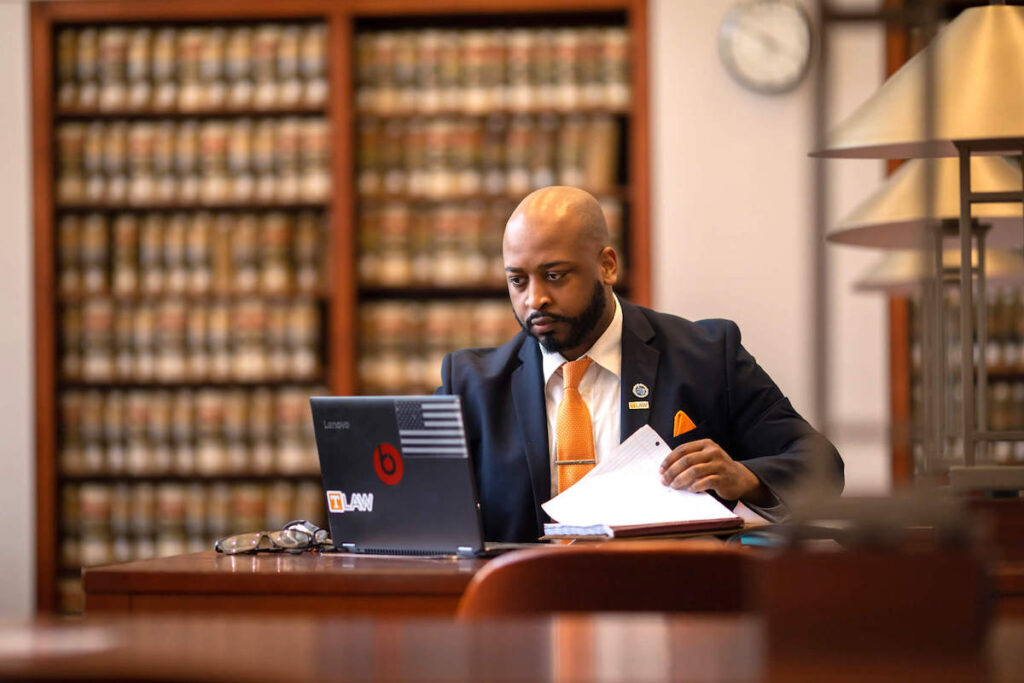In the fall of 2017, Darrius Dixon sat among a class of recruits at the police academy in Greeneville, Tennessee.
Dixon, who studied political science as an undergraduate, believed then that the natural progression of his studies should lead him to a career in law enforcement. But as the other police recruits began discussing their desires to become detectives, police captains, or federal law enforcement officers, Dixon realized he didn’t share those goals.
Dixon graduated from the academy and began working as a campus police officer for Middle Tennessee State University. But much of what he did, he said, made him feel like a “customer service employee with a gun” as he found himself encountering people on their worst days.
“It’s a problem-solving vocation,” Dixon said. “People don’t call to compliment you, or tell you everything is fine. So you’re often in these back-to-back situations of negativity.
“That’s not even including the harassment you face when you’re a black man in law enforcement,” he said.
Dixon, who will graduate Saturday during commencement ceremonies for the University of Tennessee College of Law, served as a police officer for two years before deciding to attend law school. As a police officer, he eagerly delved into human psychology.
He was trained how to deescalate a crisis and how to read body language and analyze handwriting. He visited with mental patients, some of whom had been incarcerated for murder. He even learned investigation techniques from the detective who worked the high-profile case involving the death of Caylee Anthony, an 8-year-old Florida girl whose mother, Casey Anthony, was accused and acquitted of killing her daughter.
As Dixon committed to developing his policing skills, he never forgot the college internship experience he had with a district attorney in Rutherford County, Tennessee. It gave him firsthand access to the practice of law. And while practicing law was the goal Dixon held for himself, the idea of getting admitted to law school and finding the money to pay for it was daunting.
“By spring of 2018, I was studying for [Law School Admission Test] on lunch breaks and getting my stuff together to apply to law school,” Dixon said.
A year later, with letters of recommendation from his police chief, an assistant district attorney and a Tennessee Bureau of Investigation agent, Dixon submitted his application materials to eight law schools and was admitted to seven of them.
“Of those, the University of Tennessee was the best,” he said. “And honestly, I believe my extracurricular experience may have carried me more than my undergrad GPA did.”
Now in his third and final year as a law student, Dixon’s experiences are continuing to help him hone his abilities and his interests. While working with Legal Clinic clients during the Fall 2021 semester, his work came full circle. He helped defend those who had been arrested for driving under the influence and had negative interactions with police and the legal system. In his access to justice course, he developed web programs that could help convicted felons gain certificates of employability.
Those experiences underscored for him the systemic failures of criminal justice in the United States. He saw how the judicial process can impede rehabilitation and limit the success of those who have been involved in crime.
“You can’t put people on the treadmill of a broken system.” he said. “You have to give people the tools they need to succeed so they can go work in jobs that will help them earn a decent wage to get reintegrated.”
The two summers Dixon spent working as a law clerk with the Knoxville-based firm of Lewis-Thomason broadened his interest in civil defense litigation and commercial law, and he looks forward to practicing law in areas that aren’t related to crime, he said.
But he still utilizes the skills he learned as a police officer. And because he understands how explosive situations can so easily turn into the worst moment of a person’s life, he is particularly committed to the practice of mental and physical wellbeing.
Classmate Nuraldeen Brifkani, who met Dixon on their first day of law school, said he was repeatedly impressed with his friend’s ability to empathize with others and identify when they were facing problems.
“Before law school, his job was to protect and look out for people, and I still see that shine through him as a student, a classmate and a friend,” Brifkani said. “He is the kind of person and the kind of attorney you would want on your team.”
College of Law Interim Dean Doug Blaze shares that sentiment. Because of Dixon’s insights as a police officer, Blaze looked to him in the days following the controversial death of George Floyd for advice about how the College of Law might more effectively communicate with students.
“The goal for us was to be responsive, inclusive and welcoming,” Blaze said. “Darrius was incredibly insightful and honest, and his advice invaluable.
“He told me that. listening was the most important thing of all, and that we should be genuine in our efforts and give students the chance to be part of our solutions.”
Dixon’s concern for others also drew him to become co-chair of the student wellness committee, and he cites that as one of the best experiences he’s had during law school.
“As a police officer, you learned to take time to focus your response to a particular situation and ask yourself how you want to be approached in that moment,” Dixon said. “Transferring that knowledge to the law school environment and having that outlet has been very good for me.”
